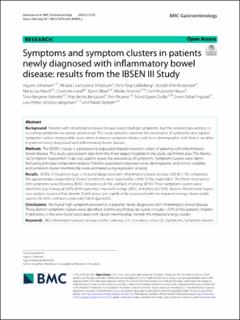| dc.contributor.author | Johansen, Ingunn | |
| dc.contributor.author | Småstuen, Milada Cvancarova | |
| dc.contributor.author | Løkkeberg, Stine Eileen Torp | |
| dc.contributor.author | Kristensen, Vendel Ailin | |
| dc.contributor.author | Høivik, Marte Lie | |
| dc.contributor.author | Lund, Charlotte | |
| dc.contributor.author | Olsen, Bjørn Christian Elias Grova | |
| dc.contributor.author | Strande, Vibeke | |
| dc.contributor.author | Huppertz-Hauss, Gert | |
| dc.contributor.author | Aabrekk, Tone Bergene | |
| dc.contributor.author | Bengtson, May-Bente | |
| dc.contributor.author | Ricanek, Petr | |
| dc.contributor.author | Detlie, Trond Espen | |
| dc.contributor.author | Frigstad, Svein Oskar | |
| dc.contributor.author | Jelsness-Jørgensen, Lars-Petter | |
| dc.contributor.author | Opheim, Randi | |
| dc.date.accessioned | 2023-08-28T06:28:59Z | |
| dc.date.available | 2023-08-28T06:28:59Z | |
| dc.date.created | 2023-08-02T09:33:32Z | |
| dc.date.issued | 2023 | |
| dc.identifier.issn | 1471-230X | |
| dc.identifier.uri | https://hdl.handle.net/11250/3085898 | |
| dc.description.abstract | Background: Patients with inflammatory bowel disease report multiple symptoms, but the relationships among co-occurring symptoms are poorly understood. This study aimed to examine the prevalence of symptoms and explore symptom clusters and possible associations between symptom clusters and socio-demographic and clinical variables in patients newly diagnosed with inflammatory bowel disease. Methods: The IBSEN III study is a prospective population-based inception cohort of patients with inflammatory bowel disease. This study used patient data from the three largest hospitals in the study catchment area. The Memorial Symptom Assessment Scale was used to assess the prevalence of symptoms. Symptom clusters were identified using principal component analysis. Possible associations between socio-demographic and clinical variables and symptom cluster membership were estimated using regression analysis. Results: Of the 573 patients (age, ≥18 years) diagnosed with inflammatory bowel disease, 350 (61.1%) completed the questionnaire (responders). Eleven symptoms were reported by >50% of the responders. The three most prevalent symptoms were bloating (84%), drowsiness (81%), and lack of energy (81%). Three symptom clusters were identified: psychological (56% of the patients), impaired energy (28%), and physical (16%) clusters. Multinomial regression analysis revealed that vitamin D deficiency was significantly associated with the impaired energy cluster (odds ratio=2.49, 95% confidence interval [1.00-6.2], p=0.05). Conclusions: We found high symptom prevalence in patients newly diagnosed with inflammatory bowel disease. Three distinct symptom clusters were identified, and the psychological cluster includes >50% of the patients. Vitamin D deficiency is the only factor associated with cluster membership, namely the impaired energy cluster. | en_US |
| dc.language.iso | eng | en_US |
| dc.relation.uri | https://bmcgastroenterol.biomedcentral.com/counter/pdf/10.1186/s12876-023-02889-y.pdf | |
| dc.rights | Navngivelse 4.0 Internasjonal | * |
| dc.rights.uri | http://creativecommons.org/licenses/by/4.0/deed.no | * |
| dc.title | Symptoms and symptom clusters in patients newly diagnosed with inflammatory bowel disease: results from the IBSEN III Study | en_US |
| dc.type | Peer reviewed | en_US |
| dc.type | Journal article | en_US |
| dc.description.version | publishedVersion | en_US |
| cristin.ispublished | true | |
| cristin.fulltext | original | |
| cristin.qualitycode | 1 | |
| dc.identifier.doi | 10.1186/s12876-023-02889-y | |
| dc.identifier.cristin | 2164424 | |
| dc.source.journal | BMC Gastroenterology | en_US |

